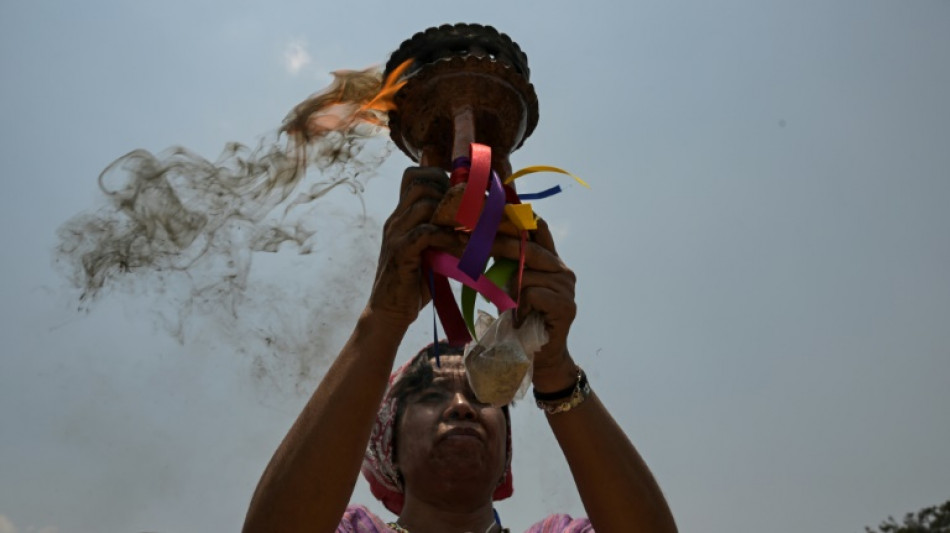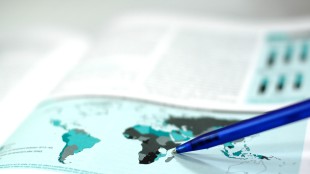
-
 The Jukebox Man on song as Redknapp records 'dream' King George win
The Jukebox Man on song as Redknapp records 'dream' King George win
-
Liverpool boss Slot says Ekitike reaping rewards for greater physicality

-
 Judge jails ex-Malaysian PM Najib for 15 more years after new graft conviction
Judge jails ex-Malaysian PM Najib for 15 more years after new graft conviction
-
Musona rescues Zimbabwe in AFCON draw with Angola

-
 Zelensky to meet Trump in Florida on Sunday
Zelensky to meet Trump in Florida on Sunday
-
'Personality' the key for Celtic boss Nancy when it comes to new signings

-
 Arteta eager to avoid repeat of Rice red card against Brighton
Arteta eager to avoid repeat of Rice red card against Brighton
-
Nigeria signals more strikes likely in 'joint' US operations

-
 Malaysia's former PM Najib convicted in 1MDB graft trial
Malaysia's former PM Najib convicted in 1MDB graft trial
-
Elusive wild cat feared extinct rediscovered in Thailand

-
 Japan govt approves record budget, including for defence
Japan govt approves record budget, including for defence
-
Seoul to ease access to North Korean newspaper

-
 History-maker Tongue wants more of the same from England attack
History-maker Tongue wants more of the same from England attack
-
Australia lead England by 46 after 20 wickets fall on crazy day at MCG

-
 Asia markets edge up as precious metals surge
Asia markets edge up as precious metals surge
-
Twenty wickets fall on day one as Australia gain edge in 4th Ashes Test

-
 'No winner': Kosovo snap poll unlikely to end damaging deadlock
'No winner': Kosovo snap poll unlikely to end damaging deadlock
-
Culture being strangled by Kosovo's political crisis

-
 Main contenders in Kosovo's snap election
Main contenders in Kosovo's snap election
-
Australia all out for 152 as England take charge of 4th Ashes Test

-
 Boys recount 'torment' at hands of armed rebels in DR Congo
Boys recount 'torment' at hands of armed rebels in DR Congo
-
Inside Chernobyl, Ukraine scrambles to repair radiation shield

-
 Bondi victims honoured as Sydney-Hobart race sets sail
Bondi victims honoured as Sydney-Hobart race sets sail
-
North Korea's Kim orders factories to make more missiles in 2026

-
 Palladino's Atalanta on the up as Serie A leaders Inter visit
Palladino's Atalanta on the up as Serie A leaders Inter visit
-
Hooked on the claw: how crane games conquered Japan's arcades

-
 Shanghai's elderly waltz back to the past at lunchtime dance halls
Shanghai's elderly waltz back to the past at lunchtime dance halls
-
Japan govt approves record 122 trillion yen budget

-
 US launches Christmas Day strikes on IS targets in Nigeria
US launches Christmas Day strikes on IS targets in Nigeria
-
Australia reeling on 72-4 at lunch as England strike in 4th Ashes Test

-
 Too hot to handle? Searing heat looming over 2026 World Cup
Too hot to handle? Searing heat looming over 2026 World Cup
-
Packers clinch NFL playoff spot as Lions lose to Vikings

-
 Guinea's presidential candidates hold final rallies before Sunday's vote
Guinea's presidential candidates hold final rallies before Sunday's vote
-
Calvin B. Taylor Bankshares, Inc. Reports Third Quarter Financial Results and Announces New Stock Repurchase Program

-
 Processa Pharmaceuticals and 60 Degrees Pharmaceuticals Interviews to Air on the RedChip Small Stocks, Big Money(TM) Show on Bloomberg TV
Processa Pharmaceuticals and 60 Degrees Pharmaceuticals Interviews to Air on the RedChip Small Stocks, Big Money(TM) Show on Bloomberg TV
-
Aptevo Therapeutics Announces 1-for-18 Reverse Stock Split

-
 Loar Holdings Inc. Announced The Completion of its Acquisition of LMB Fans & Motors
Loar Holdings Inc. Announced The Completion of its Acquisition of LMB Fans & Motors
-
IRS Can Freeze Installment Agreements After Missed Filings - Clear Start Tax Explains Why Compliance Comes First

-
 How the Terms of SMX's $111 Million Capital Facility Shape the Valuation Discussion
How the Terms of SMX's $111 Million Capital Facility Shape the Valuation Discussion
-
A Christmas Message to the DEA's Diversion Anti Marijuana Cabal

-
 QAT Community Sets QuantumTrade 5.0 for Public Beta Testing in March 2026
QAT Community Sets QuantumTrade 5.0 for Public Beta Testing in March 2026
-
BondwithPet Expands B2B Offering with Custom Pet Memorial Product

-
 Best Crypto IRA Companies (Rankings Released)
Best Crypto IRA Companies (Rankings Released)
-
Eon Prime Intelligent Alliance Office Unveils New Brand Identity and Completes Website Upgrade

-
 Villa face Chelsea test as Premier League title race heats up
Villa face Chelsea test as Premier League title race heats up
-
Spurs extend domination of NBA-best Thunder

-
 Malaysia's Najib to face verdict in mega 1MDB graft trial
Malaysia's Najib to face verdict in mega 1MDB graft trial
-
King Charles calls for 'reconciliation' in Christmas speech

-
 Brazil's jailed ex-president Bolsonaro undergoes 'successful' surgery
Brazil's jailed ex-president Bolsonaro undergoes 'successful' surgery
-
UK tech campaigner sues Trump administration over US sanctions


UN nears landmark deal on combatting biopiracy
The fight against biopiracy -- plundering genetic resources and the traditional knowledge surrounding them -- could soon be based on an international treaty which is being finalised at negotiations that began on Monday.
"Let me be candid -- negotiations will not be easy," warned Daren Tang, head of the World Intellectual Property Organization (WIPO), as the diplomatic conference began in Geneva.
After more than 20 years of talks on the subject, WIPO's more than 190 member states are meeting at the agency's Geneva headquarters until May 24 for negotiations on finalising a treaty.
The United Nations agency dealing with patenting and innovation will try to conclude an agreement by consensus.
Tang said countries were on "the cusp of a truly landmark agreement".
"There is no contradiction between a robust and predictable IP regime -- one that incentivises innovation, attracts investments and drives game-changing research -- and one that responds to the needs of all countries and their communities everywhere, including those from Indigenous peoples, as well as from local communities," he said.
The draft treaty text says patent applicants would be required to disclose from which country the genetic resources in an invention came, and the indigenous people who provided the associated traditional knowledge.
"It's about fighting biopiracy -- that's to say the use of traditional knowledge or genetic resources without the agreement of those who held them and without them being able to benefit from them," said Christophe Bigot, who is leading the French delegation.
However, Kenya, speaking on behalf of African countries, said the treaty needed to be more comprehensive and include "mandatory disclosure requirements".
"We are acutely aware of how our communities have often been marginalised and excluded from the benefits derived from the commercialisation and use of their knowledge and resources," said Kenya.
- Medicines, seeds, cosmetics -
While natural genetic resources -- such as those found in medicinal plants, agricultural crops and animal breeds -- cannot be directly protected as international property, inventions developed using them can be patented.
These resources are increasingly used by companies in everything from cosmetics to seeds, medicines, biotechnology and food supplements.
As it is currently not mandatory to publish the origin of innovations, many developing countries are concerned that patents are being granted that either circumvent the rights of indigenous people, or are issued for existing inventions.
Such cases can end up in lengthy legal battles.
Opponents of the treaty fear it will hamper innovation.
But proponents say an additional disclosure requirement would increase legal certainty, transparency and efficiency in the patent system.
It would "help ensure that such knowledge and resources are used with the permission of the countries and/or communities from which they originate, enabling them to benefit in some way from the resulting inventions", according to Wend Wendland, the director of WIPO's traditional knowledge division.
Disagreements persist, notably on setting up sanctions, and the conditions for revoking patents.
"The text has been narrowed down a lot in order to arrive at some potential compromise," expert Viviana Munoz Tellez of the South Centre, an intergovernmental think-tank representing the interests of 55 developing countries, told AFP.
But at least, the proposed treaty has "symbolic value", said Munoz Tellez.
- Overcoming North-South clashes -
More than 30 countries have such disclosure requirements in their national laws.
Most of these are emerging and developing economies, including China, Brazil, India and South Africa, but there are also European states, such as France, Germany and Switzerland.
However, these procedures vary and are not always mandatory.
"It is important to get beyond clashes that are too sterile" between the global North and South, said one diplomat, on condition of anonymity.
"Several countries in the North have genetic resources, like Australia or France, and several countries in the South have very large laboratories and companies that use genetic resources, like India or Brazil," the source added.
Two years ago, countries unexpectedly agreed to convene a diplomatic conference in 2024 to conclude an agreement.
Only the United States and Japan officially dissociated themselves from the decision, without however opposing the consensus.
Neither were opposed to the idea of establishing a treaty.
But US ambassador Sheba Crocker insisted that her country "will strive for an outcome that improves transparency and that does not undermine the policy goals or rationales of the patent system."
Japan's mission in Geneva told AFP it hoped the outcome of the conference would be "clear, reasonable and practical to apply".
P.Mathewson--AMWN


